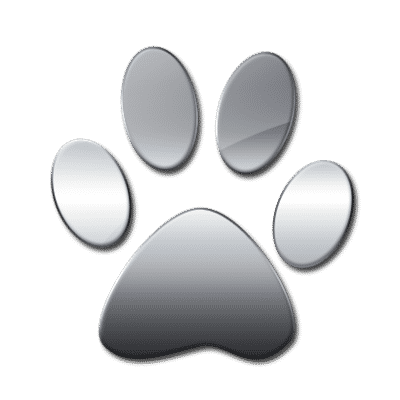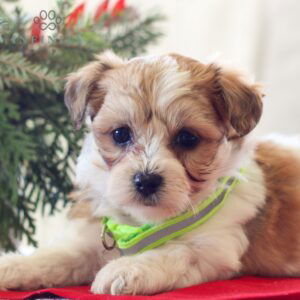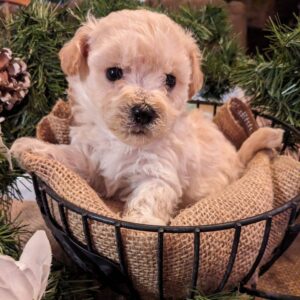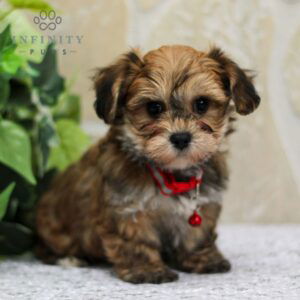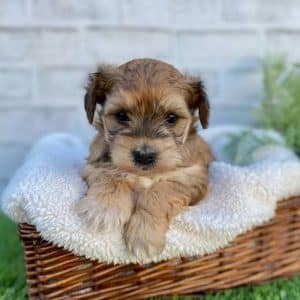Sorry, no puppies of this breed are currently available. Contact us to be notified when more are listed for adoption.
Have a question about our Yorkiechon puppies?
"*" indicates required fields
overview of the Yorkiechon Dog Breed
Are you looking for an adorable, hypoallergenic, apartment-friendly dog with a big personality?
Check out our Yorkiechon puppies for sale below!
Yorkiechons, also called Yorkie Bichons, are a cross between a Yorkshire Terrier and a Bichon Frise. A natural charmer, this breed has a low-shed coat and is perfect for small homes and apartments. Yorkiechons are energetic, fun-loving, affectionate, and love attention!
Purchase your Yorkiechon puppy today and enjoy a joyful, playful, and charming companion!
Check our all our other puppy breeds on our “all breeds” page.
Yorkiechon temperament
Apartment-friendly – Because of their small size, Yorkiechons, or Yorkie Bichons, are great for small spaces! A daily walk around the block, a game of indoor fetch, or running around the house is usually enough for a Yorkiechon.
Low-shed: Yorkies are hypoallergenic (their coat is similar to human hair), and Bichon Frises (whose coat is similar to a poodle’s) are also considered hypoallergenic. Your Yorkiechon’s coat may favor a Yorkie’s coat, a Bichon’s coat, or be a combination of the two. Whatever combination of genes your Yorkiechon receives, it will have a low-shed coat and most likely not irritate allergies as much as some breeds.
Full of Spirit- These small, energetic dogs have big personalities! It’s important to establish yourself as the leader with your dog; otherwise, your Yorkiechon may develop Small Dog Syndrome. Socializing your puppy is essential to prevent them from becoming snappy and aggressive. Expose your Yorkiechon puppy to a wide variety of situations while it’s young, so it learns what situations are normal and safe. Puppy classes are an excellent way to socialize your dog.
Charming: Both the Yorkie and Bichon are show-stopping breeds that love to be the center of attention! In addition to charming personalities, their small size, spunky spirit, and dark eyes make them irresistible.
Independence: While they are intelligent, Yorkiechons can have an independent streak. This may require consistent training and positive reinforcement.
Adaptable: Yorkiechons can adapt to various living environments, including apartments or houses with yards, as long as their exercise and mental stimulation needs are met.
Watchdog: A Yorkiechon will immediately let you know when something isn’t right and can become yappy. However, with consistent training, they can be taught not to bark excessively.
It’s important to remember that individual Yorkiechons can have variations in their temperament and behavior based on their specific lineage. Early socialization and consistent training are key to ensuring a well-adjusted and well-behaved adult Yorkiechon. Additionally, always research and choose a reputable breeder who prioritizes the health and temperament of their dogs to get a healthy and well-rounded puppy.
Yorkiechon Breed history
The Yorkiechon is a designer breed. Like most designer breeds, Yorkiechons have been developed in the past twenty years with little to no documentation about their beginnings.
Yorkiechons can be registered with:
Yorkiechons are registered under a variety of different names, including:
- Yorkiechon
- Yorkie Bichon and Bichon Yorkie
- Yo-chon
- Borkie
To get to know the Yorkiechon better let’s take a look at the histories of the Yorkshire Terrier and Bichon Frise.
The History of the Yorkshire Terrier
Yorkshire Terriers are now popular city-dwellers and glamorous lap dogs; however, it wasn’t always that way.
Today’s Yorkshire Terriers have their origins as rodent-catchers in textile mills and coal mines in Scotland. These feisty terriers were brought to England by Scottish weavers. Their small size was perfect for squeezing into spaces to catch rats and mice!
These terriers were much larger than the Yorkshire Terrier of today and were probably a combination of several terrier breeds, including the Clydesdale terrier (now extinct) and the Skye Terrier.
The dog considered the father of our modern-day Terrier, Huddersfield Ben, was born in 1865. At that time, they were called “Broken-Haired Scotch Terriers”; however, in 1870, the breed took on the name “Yorkshire Terrier,” as Yorkshire was largely where the breed was developed.
In 1886, the Yorkshire Terrier was recognized by England’s Kennel Club, and after the publicity, it became a fashionable lap dog. The Yorkshire Terrier was bred to a smaller size to fit its new lifestyle, weighing four to seven pounds.
In 1885, the American Kennel Club recognized its first Yorkshire Terrier.
Today, the Yorkshire Terrier ranks number ten out of breeds registered with AKC.
While the exact history of the Bichon Frise is uncertain, it is agreed that they are one of the older dog breeds.
While they went by different names throughout history, it is thought they originated in the Mediterranean Sea area or the Canary Islands. Some claim they have existed for over 2,000 years and were used as a trade item due to
their small size and white coats.
In the 1300s-1500s, European sailors began bringing back the small white dogs that they found during their explorations. These dogs became popular in the royal courts of Spain, Italy, and France.
From the 1500s to the early 1930’s, the Bichon Frise was often associated with royalty. However, this also meant it was an unpopular breed during events when royalty faced disapproval, such as the French Revolution.
In 1933, the official breed standard was established in France. In 1956, the Bichon Frise was brought to the United States and was recognized by the American Kennel Club as a breed in 1971.
Today, the Bichon Frise ranks forty-six out of all breeds registered by AKC.
Yorkiechon Average size
Yorkiechons, or Yorkie Bichons, are 9-12 inches tall at the shoulder and weigh 6-8 pounds.
Average Yorkiechon lifespan
Yorkiechons usually live 10-12 years.
Yorkiechon body features
Yorkiechons, or Yo-Chons, often have scruffy coats. Sometimes their coats are wavy or even curly, like a Bichon.
Their coat can be black, tan, or white and is often a combination of two of these colors.
They have dark eyes and black button-like noses.
Yorkiechons have triangular ears which often flop forward.
grooming Your Yorkiechon Puppy
In litters of hybrid pups, the genes sort out randomly, meaning that even puppies within a litter will have different traits.
For example, the coat of a Yorkiechon will vary from pup to pup, even in the same litter. Some Yorkiechons will have a coat that favors a Yorkie, and some will favor a Bichon.
The unique care your Yorkiechon will need depends on the type of coat it has. Here is some information about Yorkie and Bichon coats to help you understand the care your Yorkiechon will need.
A Yorkie’s coat is similar to human hair and may not irritate allergies as much as some breeds. They have glossy, long hair that needs to be brushed daily.
They will need to be bathed about once a week and groomed once a month.
Bichon Frise’s coat has a dense, curly coat, similar to a poodle. Like a poodle, the Bichon is very low-shed since most of the loose hair actually stays caught in their coat.
This means brushing your Bichon on a regular schedule is essential (every day is best). Brushing your Bichon removes loose hair and prevents their coat from matting and tangling, which can be very painful.
Your Yorkiechon will also need other basic grooming, such as regular teeth brushing and nail trimmings.
Keeping Your Yorkiechon Puppy Healthy
Yorkiechons are generally a healthy breed, but there are a few things their owners should be aware of in the breed. Yorkiechons, or Yorkie Bichons, are susceptible to the conditions that affect Yorkies and Bichons.
Portosystemic Shunt (PSS) is a liver defect that can occur in Yorkies. Call your vet if your Yorkie changes eating habits, becomes lethargic, depressed, or exhibits any strange or unusual behaviors. Sometimes PSS can be controlled through diet and medication, but other times it requires an expensive surgery. The good news is that many dogs are back to normal four to eight weeks after the surgery.
Yorkshire Terriers and Bichons are also prone to Patellar Luxation, which is when the kneecaps pop out of place. This condition is present at birth but only becomes apparent and problematic later on in life. Have your vet check your pup’s legs regularly and watch your dog for limping or hopping.
Like many small dogs, Yorkshire Terriers can have hypoglycemia, which is caused by low blood sugar. Watch for weakness, confusion, a wobbly gait, and seizure-like episodes in your Yorkie, and talk to your vet about possible treatments.
Bichon Frises can suffer from allergies, bladder problems, and vaccination sensitivities.
You can protect your dog from one of the most common health problems: obesity. One of the best ways to extend your dog’s life is by feeding them the correct amount of food and giving them adequate exercise.
Like all dog breeds, they are susceptible to hip and elbow dysplasia, two of the most common health issues among dogs.
Hip and elbow dysplasia occurs when the leg or hip becomes weakened, and it can result in arthritis or potential lameness if not addressed.
One of the best ways to prevent this is by keeping your dog from running excessively on hard surfaces, especially when they are puppies.
Typical Yorkiechon Allergens
Where do allergens come from?
Allergens are caused by dander, which is dead skin cells. Both animals and humans shed these dead skin cells. Dander is attached to the hair that dogs shed.
Yorkshire Terriers are not hypoallergenic, but they are considered a low shed and low allergen breed. Their hair is more like human hair than animal fur, so a Yorkshire Terrier’s shedding will be comparable to human hair ‘shedding.’
Bichon Frises have coats similar to a poodle and are considered hypo-allergenic.
- 1. How big do Yorkiechons get?Not very big! Yorkiechons usually grow to be 9-12 inches tall and weigh between 6 and 8 pounds.
- 2. Do Yorkiechons bark a lot?Yes, Yorkiechons bark a lot. They make great watchdogs and will bark to let you know when something usual is happening (good!) but are prone to excessive barking (bad!). With consistent training and sufficient playtime, they can be trained to cut back on the barking.
- 3. Are Yorkiechons easy to groom?Yorkiechons require some extra grooming. Their hair is similar to human hair. Plan to brush your Yorkiechon every day to prevent mats and tangles, and schedule regular appointments at the groomers. Remember, in mixed-breed litters, the genes sort out randomly, so each puppy receives different traits! This means your Yorkiechon’s coat may favor a Yorkie or a Bichon. Talk to your groomer about the best care for your puppy’s unique coat.
- 4. What are the different names for Yorkiechons?Yorkiechons, which are a mix between a Yorkshire Terrier and a Bichon Frise, have a number of names, including Yorkie Bichon, Yorkie Chon, Borkie, Yo Chon, Yorkshire Frise, and Yorkie Bichon Mix.
- 5. Are Yorkiechons good apartment dogs?Yes, they make great apartment dogs. Because they are so small, indoor play is a great option for Yorkiechons (they are energetic!). Don’t skip their regular outdoor walks, though!
- 6. Can Yorkiechons be left alone?It really depends. Yorkiechons that favor the Yorkshire Terrier breed are independent and don’t mind being left alone. Yorkiechons that favor the Bichon Frise breed are prone to separation anxiety.
- 7. Are Yorkiechons allergen-friendly?If you’re searching for allergen-friendly dogs, you’re in luck! Yorkiechons, or Yorkie Bichons, are one of the most allergen-friendly dogs! With Yorkshire Terrier and Bichon Frise in their bloodlines, they stand a good chance of being tolerated by people with allergies. However, each dog’s allergens are unique, and it is important to spend time with a puppy before buying it to see if its allergens irritate you. It's also important to consult your doctor if you have allergy concerns before adopting a puppy.
- 8. Are Yorkiechons a good breed for first-time dog owners?Yes, Yorkiechons are excellent dogs for first-time dog owners. They are small, low-shed dogs and are relatively easy to care for. However, potty training can be difficult, and socializing them as puppies is essential.

